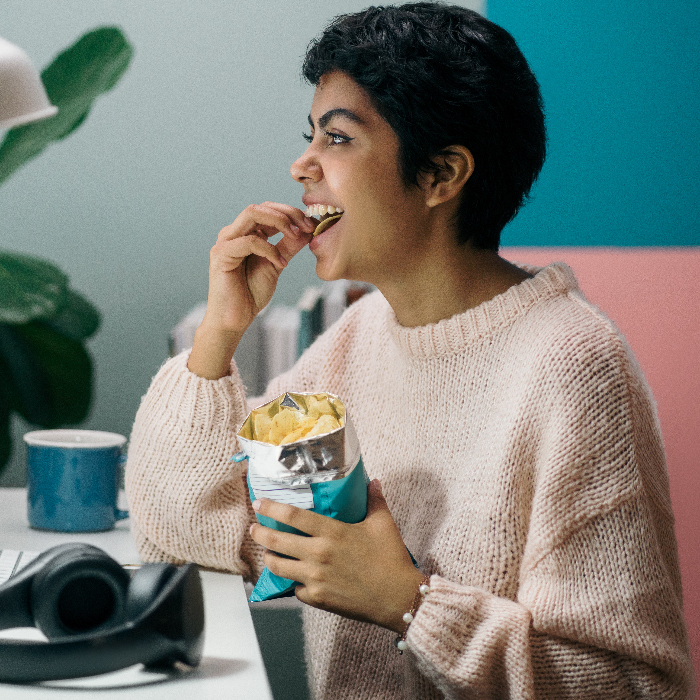Mindful eating could help you maintain a healthy weight as you learn to be more intentional, deliberate, and focused on the foods you are consuming — and why.
We’ve all done it. We’ve finished a task at work, only to walk down the hall to the breakroom to grab a few cookies, or a handful of chips, or a donut, only to realize that this was our fourth trip of the day and it’s not even lunchtime yet!
Snacking between meals, though not necessarily bad for us, could lead to grazing — eating small amounts of food without thinking about what we’re eating or paying attention to how much we are eating. Grazing is a risky eating behavior when we are working to lose weight or trying to maintain a healthy weight; it is not the same as pre-planned snacks or part of a structured eating plan. It is characterized by eating calorie-dense foods that taste good throughout the day without attending to what we are doing.
It is generally a maladaptive response to a psychological or environmental trigger. For example, we may graze because we are feeling anxious or stressed about a big meeting at work or completing a project on time. We may graze because we are bored and have nothing else to do. We may graze because we’ve created a habit of grabbing something to eat each time we pass through the kitchen, or we may graze as we watch our favorite TV show or scroll on our phones. So, what can we do when we realize we are grazing?
Practice Mindful Eating to Help with Grazing
Mindful eating is a deliberate practice wherein we focus attention on what we are eating. It is the moment-to-moment awareness of the features and characteristics of the food we’re eating — appearance, taste, smell, texture, and mouth feel of our food — coupled with attention to our bodily sensations (hunger cues, satiety cues, and/or emotions).
Cultivating a mindful eating practice can help us identify triggers for eating. For example, are we eating because we are bored, stressed, or upset? Mindful eating can help us recognize when we are full or when we might still be hungry. Steps to a mindful eating practice include:
- Pay attention to what you are eating: Be in the present moment and eliminate distractions like the TV, your phone, or computer. Take note of the size of the portion, its appearance, taste, smell, mouth feel — engage your senses.
- Eat slowly: Instead of cutting up that piece of chicken breast all at once, cut one piece at a time. Instead of racing through your meal, put your fork down between bites and pay deliberate attention to the act of chewing, how the food tastes, what it looks like, or how it smells. Pay attention to the bodily sensation of chewing and swallowing.
- Self-compassion: Offer yourself some grace if you’ve been cultivating a mindful eating practice and find yourself grazing. We’re human. We all backslide from time to time. Be non-judgmental, accept the slide backwards and re-engage your mindful eating practice.
- Plan snacks in advance: If you know that you will get hungry between meals, pack healthy food options and bring them with you. In between meals is a good time to shore up our fruit and vegetable intake, so pack some carrots or an apple.
- Be curious: Explore why you are eating and take note of any patterns that emerge. For example, you may notice that you tend to graze right before the staff meeting at work or right before you must pick up or drop off your kids with your ex-spouse. Ask yourself if you are eating because you are hungry? Bored? Concerned? Anxious? This can help you break free of habitual eating. For example, although it is 12:30 and time for lunch, pay attention to if you are hungry. You can still consume your daily caloric needs and meet your dietary goals for protein, whole grains, and fruits and vegetables, but eat when you are hungry (unless your health care provider has advised you to eat at regular intervals throughout the day; always follow your health care provider’s instructions). Be aware of situations that may trigger grazing, so you can take steps to shut it down.
If you realize you have been grazing, accept this as a piece of information to act on. Work on building a mindful eating practice and identifying situations that may trigger grazing behavior. Mindful eating could help you lose weight and maintain a healthy weight as you learn to be more intentional, deliberate, and focused on the foods you are consuming and the reasons why you are eating.
Before starting any change in diet, be sure to consult with your health care provider to determine the changes that are best for you.
About the Author: Dr. Dawn M. Sweet has over 20 years of experience in the field of communication. Sweet has given several invited talks to and workshops for academic and private sector audiences on the role of nonverbal and verbal communication in achieving positive outcomes and mitigating bias. Her research has been published in several top ranked peer-review journals, and it has been featured on NPR’s River to River / All Things Considered, Buzzfeed, and Science Daily. Her research has also been used to inform expert testimony.
The information provided on this platform is intended for informational purposes only. It is not a substitute for professional medical advice, diagnosis, or treatment. Always seek the advice of your physician or other qualified health provider with any questions you may have regarding a medical condition. Never disregard professional medical advice or delay in seeking it because of something you have read on this platform. Furthermore, the information provided here has not been reviewed or approved by a health care professional. Any reliance you place on such information is strictly at your own risk. We do not endorse or guarantee the accuracy, completeness, or usefulness of any information provided. It’s important to consult with a qualified health care professional before making any changes to your diet, exercise, medication, or treatment regimen. Reliance on any information provided on this platform is solely at your own risk.





